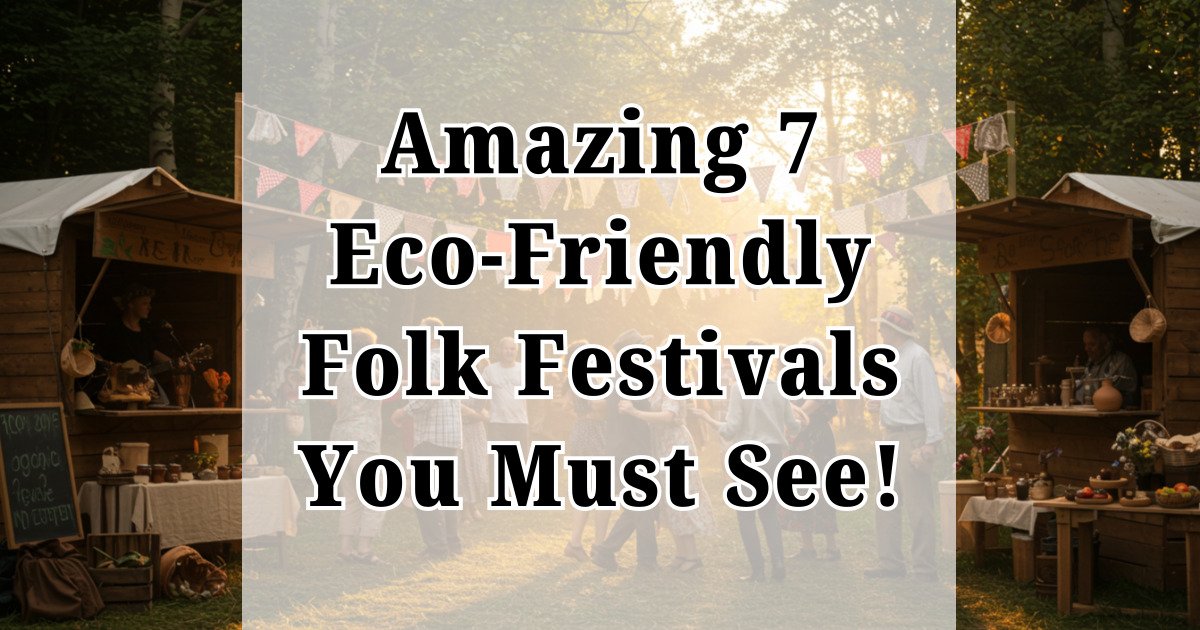Introduction: Why Eco-Friendly Local Folk Festivals Matter
Eco-friendly local folk festivals are gaining global recognition as communities strive to celebrate tradition while protecting the planet. These festivals aren’t just colorful cultural experiences—they also set an example of how to reduce waste, support local economies, and promote environmental responsibility.
In an era where climate change and overconsumption are major concerns, festivals that incorporate green practices offer a hopeful path forward. They merge environmental awareness with community pride, showcasing how age-old traditions can evolve without harming the Earth.
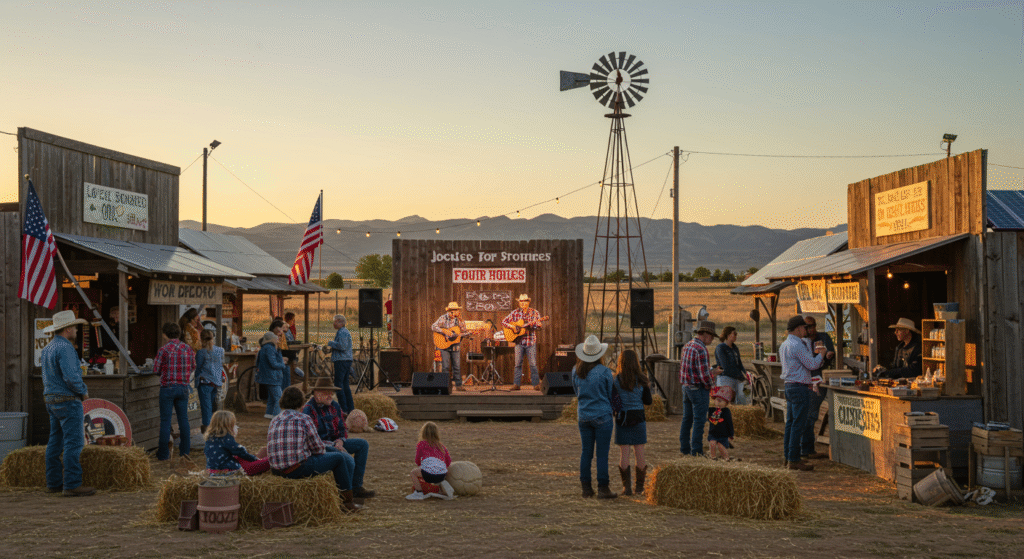
Let’s explore seven amazing eco-friendly local folk festivals that embrace sustainability and inspire others to do the same.
🌸 1. Hanami Festival – Japan’s Green Cherry Blossom Celebration
While not a traditional folk festival in the strictest sense, Hanami is deeply rooted in Japanese culture and often observed through local, family-led gatherings. Recently, cities across Japan have made efforts to make Hanami more sustainable.
Eco-Friendly Practices:
- Use of reusable picnic gear
- Public awareness campaigns about littering
- Eco-volunteers in parks collecting recyclable waste
- Public transport incentives to reduce vehicle emissions
Many local governments also promote eco-friendly local folk festivals by encouraging participants to respect nature and limit plastic waste. Hanami reflects how even centuries-old customs can adapt to modern ecological values.
🐑 2. Transhumance Festival – France & Spain
Celebrated in regions like Provence and the Pyrenees, the Transhumance Festival honors the ancient practice of seasonal livestock migration. It’s a charming rural tradition that showcases pastoral life, folk music, and regional cuisine.
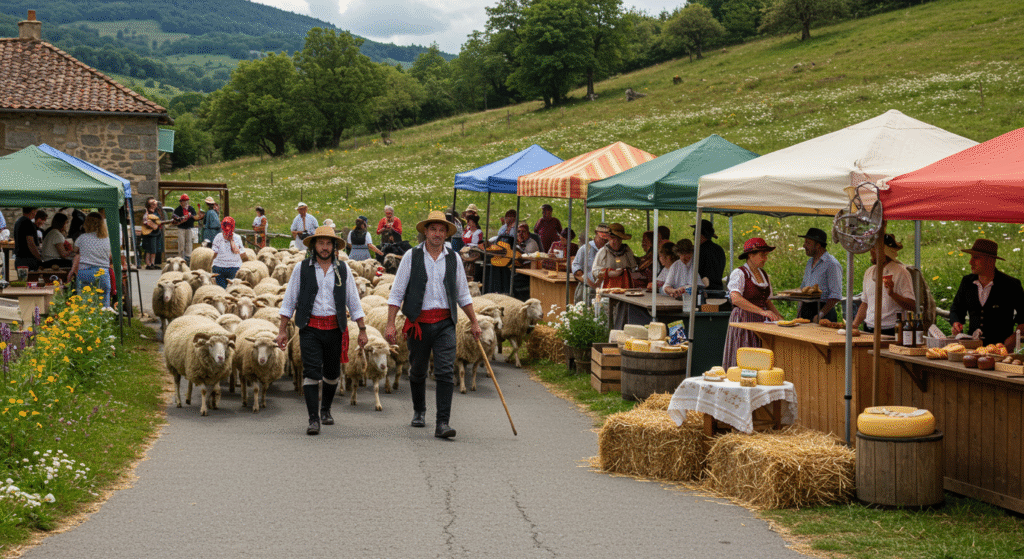
Image generated using ImageFX
Sustainable Highlights:
- Promotes biodiversity through traditional grazing routes
- Local food markets use organic produce
- Handmade crafts replace mass-produced souvenirs
- Events powered by solar panels in some locations
This event stands out among eco-friendly local folk festivals because it naturally revolves around sustainable land use and community-based living.
🔥 3. Beltane Fire Festival – Scotland’s Green Revival of Pagan Tradition
Held in Edinburgh each May, the Beltane Fire Festival reimagines ancient Celtic traditions in a vibrant, theatrical way. What makes it particularly notable is its community-driven, low-impact design.
Green Initiatives:
- Costumes made from upcycled materials
- Use of biodegradable props
- Volunteer-run, locally sourced events
- Carbon offset donations from ticket sales
The Beltane Fire Festival is a prime example of how eco-friendly local folk festivals can both honor historical roots and lead the way toward a sustainable future.
🍃 4. Riddu Riđđu – Norway’s Indigenous Sami Festival
The Riddu Riđđu Festival celebrates the Indigenous Sami people of Northern Norway. It serves as a platform for Indigenous voices from all over the world and places strong emphasis on sustainability.
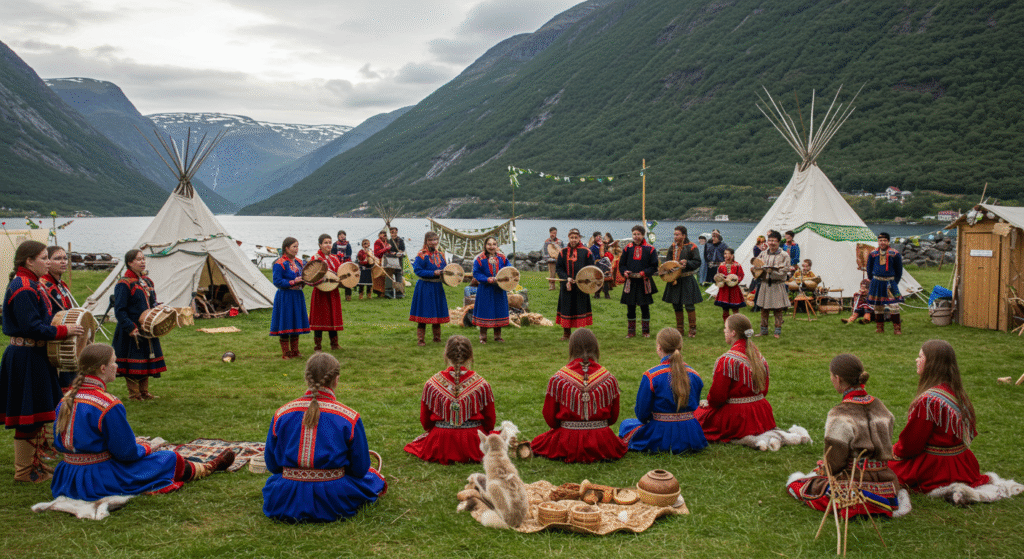
Image generated using ImageFX
Eco Actions:
- Organic catering with local ingredients
- Focus on Indigenous ecological knowledge
- Eco-toilets and strict recycling measures
- Carbon offset partnerships for long-distance travelers
What makes Riddu Riđđu exceptional among eco-friendly local folk festivals is its holistic integration of environmental care into Indigenous wisdom and artistic expression.
🏔 5. Mountain Song Festival – North Carolina, USA
Nestled in the Blue Ridge Mountains, this folk and bluegrass music event is known not only for its toe-tapping tunes but also its unwavering environmental ethics.
Green Standards:
- 100% of festival power sourced from solar and biodiesel
- Reusable cup programs to reduce single-use waste
- Eco-education booths for kids and families
- Composting stations throughout the grounds
Thanks to its eco-commitment, the Mountain Song Festival ranks high on any list of eco-friendly local folk festivals in North America.
🛶 6. Rainforest World Music Festival – Sarawak, Malaysia
Held in the heart of Borneo, this music celebration honors both global folk traditions and the delicate rainforest ecosystem.
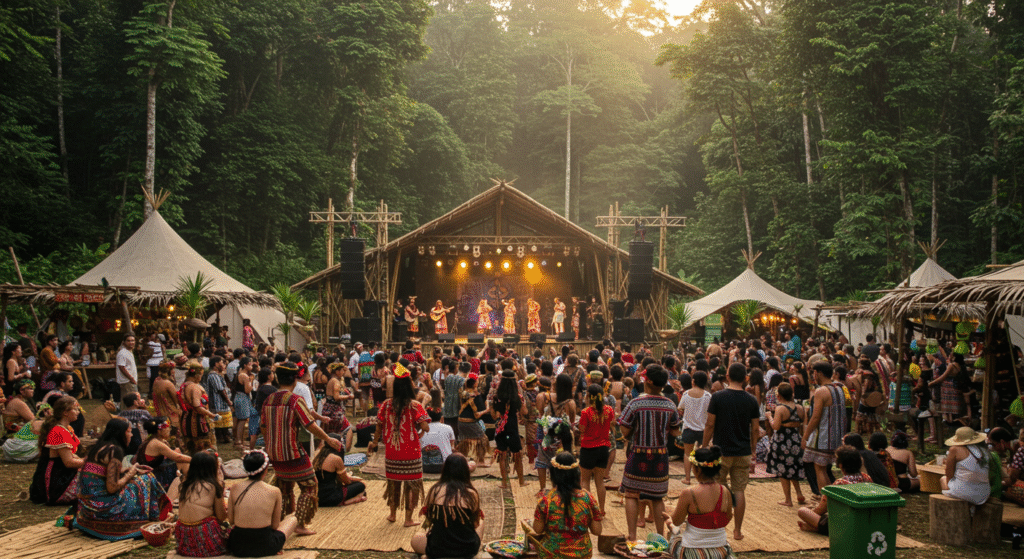
Image generated using ImageFX
Environmental Efforts:
- Shuttle buses reduce carbon footprint
- Reusable water bottles and filtered water stations
- Tree planting campaigns connected to the event
- Focus on cultural preservation and local crafts
The Rainforest World Music Festival not only promotes sustainability but does so in one of the world’s most biologically diverse regions. It’s a standout among eco-friendly local folk festivals for its educational focus on environmental and cultural preservation.
🍂 7. Appleby Horse Fair – England’s Traditional Gathering with a Green Twist
One of the oldest horse fairs in Europe, Appleby Horse Fair brings together the Gypsy and Traveller community each year. In recent years, the festival has embraced green initiatives to reduce its impact on the surrounding landscape.
Sustainability Features:
- Public clean-up crews employed by community groups
- Water refill stations provided throughout the town
- Limited motor vehicle access to reduce pollution
- Support for local, environmentally conscious vendors
By merging age-old customs with modern ecological thinking, Appleby Horse Fair has become one of the more surprising additions to the eco-friendly local folk festivals movement.
🌏 Why These Festivals Lead the Way
These events aren’t just entertainment—they are active demonstrations of how culture, environment, and community can align. Eco-friendly local folk festivals show us that sustainability doesn’t require abandoning heritage. Instead, it encourages us to innovate within tradition.
Whether it’s by reducing plastic use, supporting local agriculture, or promoting public transport, these festivals make a real-world impact. They set new standards for what gatherings can be in a climate-conscious era.
By attending or supporting such festivals, we contribute to a greener planet and keep valuable cultural expressions alive. It’s a win-win for Earth and its diverse inhabitants.
🛠 How to Organize Your Own Eco-Friendly Local Folk Festival
If you’re inspired by these global examples, you might be wondering: “How can my community start its own eco-friendly local folk festival?” The good news is, whether you’re in a small town or a bustling city, it’s entirely possible to organize a sustainable celebration of local culture.

Step 1: Define the Purpose and Theme
Begin by identifying the cultural aspect you want to celebrate—whether it’s a harvest tradition, an Indigenous ritual, or a seasonal celebration. From the very start, make eco-friendliness part of the festival’s core values.
Key questions to ask:
- What traditional practices can we highlight that support sustainability?
- Can we incorporate local artisans and eco-friendly food vendors?
- How can we reduce the event’s carbon footprint?
Step 2: Choose a Sustainable Location
Pick a site that aligns with your environmental goals. Parks, nature reserves, and open community spaces are ideal—but be sure to consider the impact of crowd size on the local ecosystem.
Eco-friendly considerations:
- Accessibility via public transport or bicycle routes
- Availability of natural shade and fresh air
- Permission for waste management infrastructure (recycling bins, compost toilets)
Step 3: Partner with Local Stakeholders
Local farmers, green startups, traditional craftsmen, and environmental groups can all play a part. The more community ownership involved, the more authentic and impactful the event becomes.
Types of partners to consider:
- Organic farmers for sustainable catering
- Folk musicians and dancers for performances
- Environmental NGOs for education booths
- Local schools for youth engagement
♻️ Sustainable Event Practices That Make a Difference
To ensure your eco-friendly local folk festival walks the talk, focus on these impactful practices:
1. Waste Management Plans
Implement a clear “Zero Waste” strategy with:
- Clearly labeled recycling, compost, and landfill bins
- Volunteer waste sorting teams
- Refillable bottle stations and ban on single-use plastics
2. Eco-Friendly Materials
Design and decorate using:
- Recycled or biodegradable signage
- Natural fabric banners and streamers
- Upcycled stage materials and bamboo fencing
3. Renewable Energy
If possible, power your event with:
- Solar panels
- Wind turbines (for rural/highland regions)
- Green energy providers
Many eco-friendly local folk festivals have successfully implemented renewable energy by working with local cooperatives or clean-energy sponsorships.
4. Sustainable Transportation
Reduce emissions by encouraging:
- Group shuttle buses
- Bike rentals or parking
- Incentives for attendees who carpool or use public transit
Transportation often accounts for the largest carbon output at festivals, so this step is crucial for a truly eco-friendly initiative.
📈 The Growing Popularity of Eco-Friendly Local Folk Festivals
More and more communities are recognizing the dual value of cultural preservation and environmental responsibility. In fact, many governments and tourism boards now fund or support eco-friendly local folk festivals as part of their green development plans.
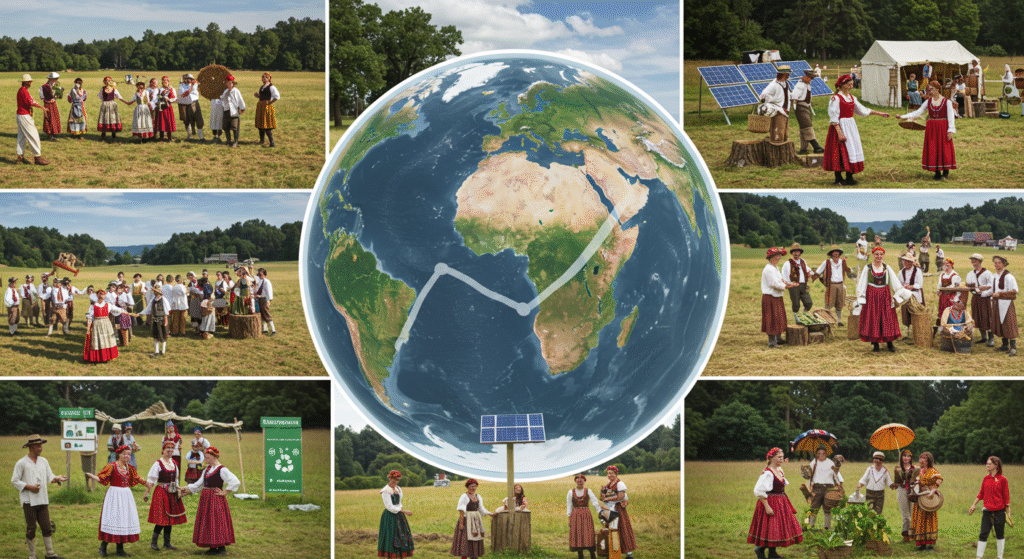
Global Trends Driving Growth:
- Climate-Conscious Millennials and Gen Z: Younger audiences actively seek out eco-responsible events.
- Green Tourism: Tourists increasingly prefer destinations with ethical, eco-friendly practices.
- Policy Shifts: Municipalities offer incentives for zero-waste or green-certified events.
- Media Attention: Festivals with strong environmental missions gain more press and online traction.
According to a recent report by the Green Events Alliance, events labeled “eco-friendly” saw a 28% increase in attendance compared to traditional festivals in the last three years.
🌍 Real-World Case Study: The Eco Folk Festival in New Zealand
Let’s take a deeper look at the Eco Folk Festival in Nelson, New Zealand. This festival has quickly become a model example of how to successfully blend cultural celebration with environmental integrity.
Key Success Factors:
- 100% locally sourced vegetarian food stalls
- Live folk music powered by solar amps
- Biodegradable ticketing and QR-based entry to reduce paper waste
- Community workshops on composting, permaculture, and Indigenous Maori traditions
Their motto, “Leave only music behind,” encapsulates the ethos of the event. The Eco Folk Festival has inspired nearby towns to replicate its format, contributing to a growing network of sustainable celebrations across Oceania.
🧠 Educational Opportunities at Sustainable Festivals
Another powerful aspect of eco-friendly local folk festivals is their educational potential. These events provide a unique space to teach environmental practices in a fun, engaging way.
Common Educational Features:
- DIY workshops (e.g., how to make beeswax wraps)
- Panels on traditional ecological knowledge
- Kids’ games centered around recycling and upcycling
- Demonstrations on renewable energy or water conservation
By embedding learning into celebration, festivals nurture future generations of environmentally aware citizens.
🛍 Supporting Local Economies with Sustainable Markets
Sustainability isn’t just about carbon footprints. It also includes economic sustainability. Many eco-friendly festivals host green markets that feature:
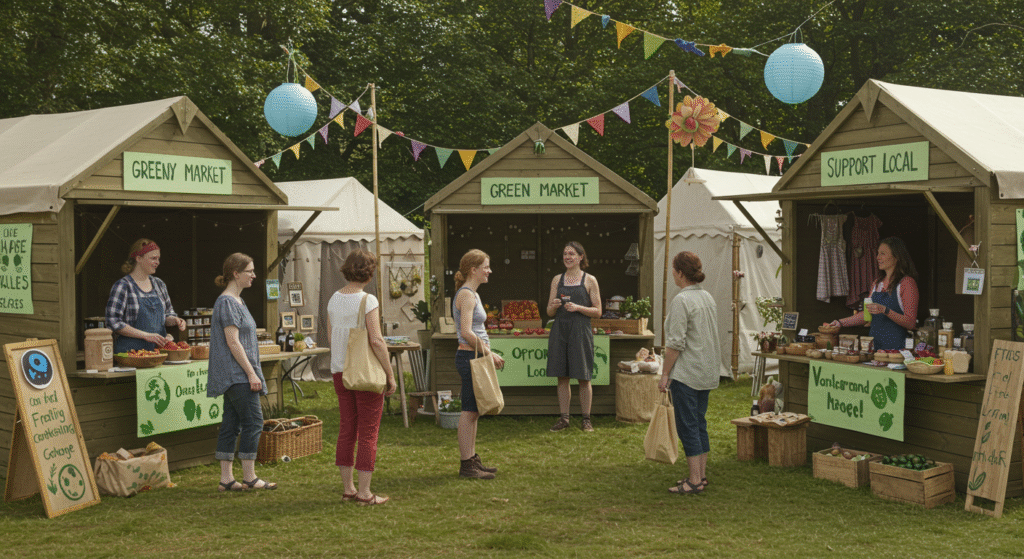
- Organic produce and handmade crafts
- Herbal remedies and traditional soaps
- Upcycled fashion and accessories
- Art created from natural or recycled materials
These markets provide vital income for local artisans and entrepreneurs, keeping money within the community and reinforcing the value of local resilience.
🌟 Why You Should Attend an Eco-Friendly Local Folk Festival
Still on the fence about going to one of these festivals? Here’s why it’s worth your time:
✅ Personal Fulfillment
Enjoy authentic, unplugged experiences that honor the Earth and connect you with community and culture.
✅ Environmental Impact
Your participation supports sustainable practices and spreads awareness on the importance of green living.
✅ Cultural Appreciation
Gain deeper insight into Indigenous and local traditions, music, food, and storytelling in a respectful setting.
✅ Support Local Communities
Whether it’s buying handmade items or trying regional dishes, you help small businesses thrive.
🚀 How to Find Eco-Friendly Local Folk Festivals Near You
If you’re ready to dive in, start by checking these platforms:
- Green Festival Alliance (GFA)
- Earth-Friendly Events Calendar
- Local tourism boards with a sustainability section
- Facebook Events & Meetup (use tags like “eco-friendly” or “green festival”)
Also, don’t hesitate to reach out to environmental NGOs or community centers, as they often co-host or sponsor such events.
Final Words
As we’ve seen, eco-friendly local folk festivals are so much more than a fleeting weekend party. They’re vibrant, living demonstrations of how culture and sustainability can walk hand-in-hand. They teach us to celebrate wisely, support one another locally, and protect the planet globally.
From Japan to Norway to your own backyard, these festivals are building a more beautiful, balanced world—one song, dance, and shared meal at a time.
If you want to read more post about Local Folk Festivals:
Top 10 Local Folk Festivals for Solo Travelers You Can’t Miss
What to Wear to Local Folk Festivals: 10 Stylish Outfit Ideas You’ll Love
Must-Know 18 Photography Tips at Local Folk Festivals
Amazing 10 Unique Local Folk Festivals in Rural Areas You Must Experience
Irresistible 10 Reasons to Love Local Folk Festivals and Local Food
